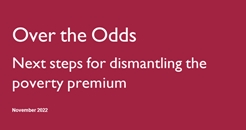 Dismantling the poverty premium
Dismantling the poverty premium
From a report by the Centre for Social Justice (CSJ)
Across Britain, consumers are cutting back in the face of a surging cost of living. With inflation at 11 per cent, the Office for Budget Responsibility predicts that living standards will decline by 7 per cent over the next two years and our material lives will worsen.
Consumers will find themselves paying more for goods and services and, in some cases, volatile incomes and increased uncertainty will mean they struggle to satisfy affordability requirements they once thought viable.
Yet some consumers already find themselves starting from behind, paying more for basic goods and services due to the way the market interacts with their choices, needs, and wants. The limited financial means of consumers on low incomes reduces their overall economic flexibility and creates more costly choices, which, in turn, serves to reduce their overall means. This cycle of paying over the odds makes up the poverty premium.
The CSJ estimate that nearly seven million people in Great Britain are paying multiple poverty premiums – this is where low-income households pay more than those on higher incomes to access essential products and services, such as insurance, credit, energy, and food. The latest estimates suggest, these premiums cost about £478 per year, sapping away greater proportions of incomes and reducing the overall living standards of those on low incomes.
But the cost of these premiums is more than just financial. By reducing low-income consumers’ overall means, these premiums are responsible for decreasing their ability to access the basic building blocks needed to build a strong foundation from which to build. Without this foundation, a focus on a brighter, long-term future is more difficult to achieve and economic potential is left unlocked.
In their report, 'Over the Odds - Next steps for dismantling the poverty premium', they show which premiums consumers report paying and how they are reacting to the increased cost of living and suggest some additional steps that Government and businesses can adopt. The report contains 22 recommendations which cover a range of sectors. These are summarised as follows:
1. Reducing the cost of energy and other utilities
-
Tackling digital exclusion. Being digitally excluded limits access to the market, to search for deals, access best prices, and keep abreast of changes in a fast-paced market. Government and firms across sectors affected by the poverty premium need to focus on what they can do to support customers to access their services digitally.
-
Seeking alternative ways to pay. Consumers on low incomes are more likely to pay in non-standard ways, such as through a pre-payment meter or upon receipt of a bill. Both tend to cost more than via direct debit. Energy firms need to reduce the burden on those who do not pay via direct debit, alternative ways to pay.
-
Increasing uptake of existing support. The Government has supported consumers with their energy bills at much cost. But this support is harder to access for some and only two-thirds of those with pre-payment meters have redeemed their support. Energy firms should exceed their obligations to proactively reach out to customers and ensure they redeem the support they are eligible for.
-
Encourage use of social tariffs. Firms should encourage the uptake of social tariffs amongst existing customers on prepayment meters, universal credit.
2. Alleviating the increased price of food
-
Convening and spreading innovative programmes. Consumers on low incomes are more likely to remain within their locality and this leads them to regularly shop at smaller outlets of major supermarkets with higher prices than all consumers. They are also more likely to purchase in smaller quantities, also paying more. The Government should convene supermarkets of all sizes to encourage new programmes to reduce food costs, such as placing cheaper, healthier food in smaller stores.
3. Supporting consumers to access cheaper financial services
-
Ensuring better market outcomes and expanding insurance products. Low-income consumers are known to pay more for insurance because of where they live, how they pay, and for their loyalty. The Financial Conduct Authority undertakes work to understand the effectiveness of risk pricing in the insurance market. Consumers on low incomes are also less likely to possess home and vehicle insurance despite wanting it because they cannot afford the premiums. Consumers are left unprotected. The Financial Conduct Authority should work with firms to understand what regulatory barriers exist to the creation of simple, basic products to reduce financial exclusion.
-
Passing on consumers to credit and support services. Not all consumers can be serviced by credit providers. Creditors should help consumers access credit and debt advice by integrating a pass- on system if they are declined.
-
Increasing the provision of affordable credit. Where low-income consumers access credit, it is more likely to be high cost. Banks and other large-scale financial institutions should explore partnerships with financial inclusion bodies, such as Fair4All Finance, to improve access to affordable credit.
-
Ensure access to free cash. The Financial Services and Markets Bill will ensure access to cash services, but it will not ensure access to free cash services. HM Treasury should support cash access by recognising the importance of free cash in its forthcoming policy statement.
Ameliorating an exacting social cost
-
Expediting the rollout of support for acute difficulties. Those paying poverty premiums are consistently found to be more likely to suffer an exacting social cost in response to the cost-of-living crisis, including using addictive substances. Government should continue to implement its addiction strategy and recommendations of the Drug Review as well as its review of the Gambling Act to update consumer protections.
Download the full report here.
How can your organisation reduce the poverty premium directly e.g. basic products or indirectly e.g. access to computers?
Retweet about this article:
From a report by the Centre for Social Justice (CS, 06/12/2022